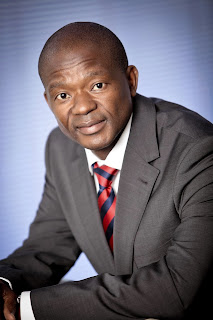At an event held at Gallagher Estate in Midrand, Johannesburg, South Africa, Samsung Electronics Africa showcased the company’s first ever
Digital Village; solutions which use a renewable and environmentally-friendly resource (solar power) to improve the
lives of Africa’s inhabitants.
(Photograph: Pan-African ambassadors and High Commissioners to South Africa inside the Samsung Solar-Powered Internet School)
(Photograph: Ntutule Tshenye, Head: Public Affairs & Shared Value Creation, Samsung Electronics Africa)
Samsung Electronics’ research team paid specific attention to solutions
which are cost-effective, mobile, easy to set up and which are suited to the
harsh climatic conditions of Africa. “We have developed a complete solar digital
solution for both rural villages without power, and urban neighbourhoods that
are subjected to fluctuating electricity supply. The resultant offerings
include a complete education system infrastructure, power generation for small
business enablement, a tele-medical centre for quick and accurate diagnoses, a
health centre for the treatment of basic illnesses, and basic lighting,”
Tshenye explains.
(Photograph: The interior of the mobile, solar-powered Telemedical Centre)
The Samsung Digital Village includes: Solar Powered Internet Schools (SPIS) - the exclusively solar-powered, mobile and
completely independent classroom is geared at increasing accessibility to
education and connectivity across Africa. Solar Power Generator – Traditional diesel generators utilise
non-renewable resources and pollute the environment with fumes and noise. A
solar power generator can be deployed in less than an hour and for increased
power needs, a number of generators can be daisy chained. The generator is also
an ideal solution for homeowners, small businesses, remote border posts and
schools. Solar Powered Health Centre - provides professional, qualified medical care,
thereby eliminating economic and geographic barriers. Telemedical Centre - provides remote medical assistance through a
centralised pool of medical expertise and experience. This will reduce the need
for qualified doctors in rural areas and reduce the distances that patients
need to travel for diagnosis. LED lighting - the solar-powered lantern uses light emitting
diodes (LEDs), which are more energy efficient and last much longer than
conventional light bulbs. Charged from a central charging kiosk that is
equipped with a solar rooftop, the lanterns are expected to provide lighting
for more than 10 years while producing no greenhouse gases.
(Photograph: Mobile, solar-powered Samsung Health Centre)
The Samsung Digital Village model addresses one of
Africa’s largest economic challenges, namely electrification. On average, less
than 25% of rural areas on the continent benefit from electricity, resulting in
isolated communities with limited access to education, healthcare and connectivity, all of which are key to socio-economic upliftment. “The initiative is an
example of Samsung’s investment in CSR (corporate social responsibility) on the continent: a keen focus on
education, healthcare and access and harnessing the company’s legacy of
innovation to respond to the felt needs of people on the continent,” concluded Tshenye.
About Samsung Electronics
Co., Ltd.
Samsung
Electronics Co., Ltd. is a global leader in technology, opening new
possibilities for people everywhere. Through relentless innovation and
discovery, we are transforming the worlds of televisions, smartphones, personal
computers, printers, cameras, home appliances, LTE systems, medical devices,
semiconductors and LED solutions. We employ 270,000 people across 79 countries
with annual sales of US$187.8 billion. To discover more, please visit www.samsung.com




Comments
Post a Comment